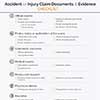Learn what to do if your Arizona insurance provider leaves you stranded
Life is full of risk and uncertainty. An insurance policy is intended to give you some peace of mind by providing financial support in the event of a loss. But what happens when an insurance company behaves inappropriately by misrepresenting a policy term, denying a legitimate claim, or failing to investigate a claim?
An insurance “bad faith claim” is a legal term used to describe a claim that an insured person may have against their insurance company for its “bad acts.”
This article takes a close look at bad faith claims in Arizona, including the duties an insurance company owes according to state law and what damages can be recovered when those duties are breached.
Overview of Arizona bad faith laws
In Arizona, all insurance contracts have an “implied covenant of good faith and fair dealing.” In plain English, this means that your insurance company is required to deal with you (the “insured”) honestly, fairly, and in good faith so that you can receive the benefits of the insurance contract.
If your insurance company breaches this implied covenant of good faith and fair dealing, you can sue the company for the tort of bad faith.
Insurance bad faith statute of limitations
In Arizona, insurance bad faith claims have a 2-year statute of limitations, which begins to run the moment the insurance company commits the bad act.
This means that you must file your lawsuit within 2 years of the date the insurance company commits the bad act, otherwise you risk having your lawsuit dismissed.
Proving a bad faith claim in Arizona
In Arizona, the insured person has the burden of proving a bad faith claim. To do this, you must prove the following two things:
- The insurance company acted unreasonably, and
- The insurance company knew that its conduct was unreasonable or the conduct was so reckless that knowledge should be imputed to the insurance company.
So, how can you tell if the insurance company acted “unreasonably?”
Arizona Unfair Claim Settlement Practices Act
Arizona is unique in that it has the Arizona Unfair Claim Settlement Practices Act. This Act (along with the Arizona Administrative Code) lists specific standards of conduct that must be met by all insurance companies. If an insurance company fails to meet these standards, the Arizona Department of Insurance has the power to bring an action against the insurance company for unacceptable business practices.
So how does the Act help you as the insured?
Unfortunately, the Act doesn’t allow you to bring a lawsuit based solely on your insurance company’s failure to meet state standards. In legalese, this means that the Act doesn’t provide a “private right of action.”
Nevertheless, the Act can be used as a general guideline to help determine whether your insurance company acted unreasonably. To put it simply, if your insurance company failed to meet a specific standard listed in the Act, it probably acted unreasonably.
With that in mind, let’s take a closer look at the Act.
The Act can be broken down into three general categories of regulations:
Misrepresentations
The Act prohibits insurance companies in Arizona from:
- Misrepresenting relevant facts or insurance policy provisions
- Imposing requirements that aren’t in the insurance policy
- Offering lower than reasonable settlement amounts to compel the insured to litigate
- Trying to settle claims for less than should be reasonably expected based on the insurance company’s advertisements
- Settling when liability is reasonably clear
Claim responses
The Act prohibits insurance companies from:
- Failing to acknowledge and act reasonably and promptly with respect to insurance claims
- Failing to accept or deny a claim within 15 working days after receipt by the insurer of a proof of loss
- Failing to provide explanations for claim denials or settlement offers
- Denying a claim without a reasonable basis (an insurer’s failure to pay a claim is “reasonable” if the validity of the claim is “fairly debatable” after an “adequate investigation”)
Investigations
The Act prohibits insurance companies from:
- Refusing to pay a claim without conducting a reasonable investigation using all available information
- Failing to complete an investigation within 30 days after notification of the claim (unless such investigation can’t reasonably be completed within such time, at which point the reasons the investigation can’t be completed must be communicated to the insured)
- Destroying or altering documents to conceal evidence of claim handling
First-party claims vs. third-party claims
An insurance bad faith claim can stem from a first-party claim or a third-party claim.
A first-party claim occurs when you file a claim with your own insurance company after an accident or an injury. A first-party bad faith claim might involve your own insurance company’s refusal to pay your claim without a reasonable basis or without properly investigating your claim in a timely manner.
A third-party claim involves liability insurance (a policy that you purchase in order to protect yourself from claims made by other people). A third-party bad faith claim might occur when your insurance company unreasonably fails to defend, indemnify, or settle a claim made against you.
What damages can you recover in Arizona?
In general, the following damages are recoverable in an Arizona bad faith claim:
- Punitive damages. Punitive damages are rare and only available if the insurance company (1) intended to injure you, (2) engaged in conduct that the insurance company knew was likely to injure you, or (3) engaged in conduct so outrageous that it can be assumed the insurance company intended to injure you.
- Emotional distress. You can recover damages for any anxiety, emotional distress, or embarrassment suffered as a result of the insurance company’s bad faith.
- Consequential damages. This includes any other damages that occurred because of the insurance company’s bad faith.
- The amount due under the insurance policy up to the policy limits. For example, if your insurance company improperly denies your claim for $400,000, you can recover the full $400,000 (assuming the amount is under the policy limits).
- Attorney fees. The court can force the insurance company to pay any attorney fees that you had to pay as a result of having to litigate the bad faith claim.
What to do if you suspect your insurance company is acting in bad faith?
If you suspect your insurance company is acting in bad faith, there are a couple of things you’ll want to do.
First, be sure to document everything. This includes everything related to your underlying claim (e.g., medical records and witness statements).
But it also includes everything related to your dealings with the insurance company about your claim such as records of telephone conversations with your insurance adjuster and written correspondence from the insurance company.

Checklist of 30 items to help you prepare for making a personal injury or accident claim
Download in PDF format
Second, reach out to an experienced Arizona attorney. When you meet with the attorney for the first time, be sure to bring along a folder with all of the documentation that you have been keeping.
If you’re not sure how to find an attorney, read our article on picking the right Arizona attorney for your case and consider locating an attorney using our free online directory.

Worksheet with questions to ask a personal injury attorney to help determine if he or she will be a good fit for your case
Download in PDF format
What does an injury lawyer do?
A personal injury lawyer helps individuals who have sustained injuries in accidents to recover financial compensation. These funds are often needed to pay for medical treatment, make up for lost wages and provide compensation for injuries suffered. Sometimes a case that seems simple at first may become more complicated. In these cases, consider hiring an experienced personal injury lawyer. Read more














